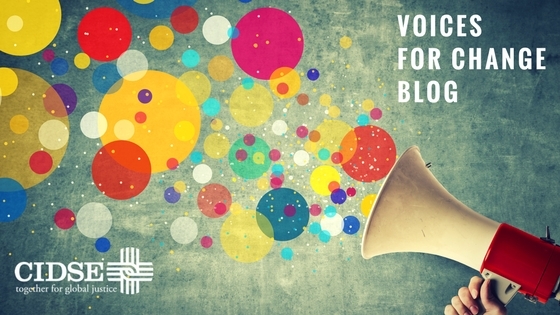
We are proud to launch CIDSE’s new “Voices for Change” blog. This blog space is dedicated to “systemic change.” It will reflect and analyse current issues that are challenging and transforming systems such as those for producing and consuming food or energy, at their intersection with greater systems of injustice: patriarchy, racism, colonialism or capitalism. It will also bring stories of change to break out of abusive and unjust systems, however small or big the change. We look forward to contributions from the CIDSE family, partners and allies to this blog space.
Less than a decade ago, CIDSE embarked on a new journey that we called the “Paradigm Shift.” In this journey, we started to challenge our assumptions of development and impact as well as general assumptions of growth and prosperity linked to clearly unsustainable models of living and the economy.
Out of this journey came CIDSE’s current strategic framework. It sets out our ambition to be prophetic and inspirational. Our ambition is to set the agenda rather than to simply respond to the political agenda set by governments. We are convinced that the deep transformation that we urgently need in the face of the interlinked climate and social crises comes from below, from people striving for a better life, for human dignity. Our agenda is to promote solutions and alternatives that people themselves bring up, that people themselves work for and which work for people themselves. Our systemic change agenda calls us to push boundaries: the boundaries of North and South, the boundaries between human beings and nature, the consumers and the producers/suppliers, the boundaries of power, the boundaries of equality, starting with gender equality. We aim to offer innovative alternatives that overcome these boundaries. The alternatives we put forward are inspired and rooted in the challenges and solutions of our partners in the South and the North.
The challenge. Rising from the environmental and social ravage caused by mining disasters such as the Fundão dam burst on 5 November 2015, in the municipality of Mariana in Minas Gerais, Brazil is growing support for the global movement for a binding international legal instrument to hold companies directly responsible for human rights violations. Justice is the first demand of this growing movement. At the same time, they are calling for a broader societal debate: is there a place for large extractive projects in a world that ends human being’s exploitative relationship with nature? In a world where there is less demand for natural resources due to a transformed system of production and consumption? When such projects do not bring huge, windfall profits to investors due to an overhauled economic system?
The solutions. The farmers’ network Masipag in the Philippines, brings together farmers and experts in a partnership to enhance small farmer’s empowerment and end their dependence on seeds and other inputs sourced from trans-national, profit-oriented agrobusiness. Thanks to this network, small farmers have managed to retrieve traditional rice varieties. They have developed a thousand improved rice varieties through breeding and selection. Such rice varieties are better adapted to extreme weather events and climate change. At the same time, thanks to agroecological practices they respect the natural balance between protecting the earth and harvesting her riches. Many argue that small-scale agriculture can produce enough food to overcome the current crises of hunger and malnutrition. There is also a growing body of evidence from our partners, showing that agroecology by its very nature is at the heart of changing systems of patriarchy in agrarian societies: by providing spaces for women to work in solidarity and gain livelihoods, income and support. Such experiences also give women the confidence to do more political work and challenge unjust laws, including customary laws in their communities that they find to be discriminatory towards women (Focus on the Global South, 2017).
These and other stories of vision, innovation and transformation will find themselves to the “Voices for Change” blog. We hope it will be a source of much inspiration to overcome system lock-ins and towards systemic change.
